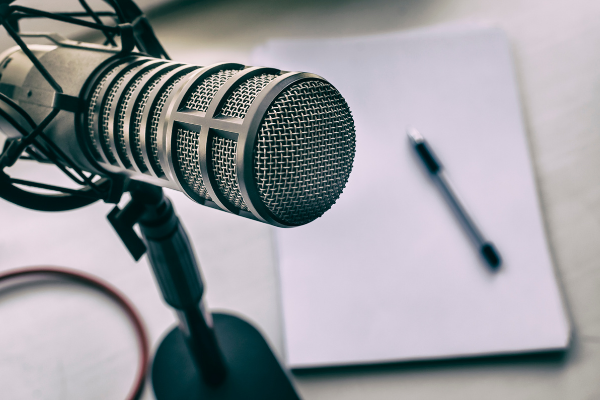As most of you are familiar with, a podcast is a digital audio series in which the host speaks on a particular subject matter or theme, for instance, economics or law, etc. It is similar to a radio programme in terms of presentation but unlike the latter, users have to subscribe to the podcast for listening access after which they can listen to any episode at any time of their choosing. Also, radio players are characterized by formal regulation which is not the case with podcasts. Podcasts can come in audio or video formats, all of which is distributed through the internet. They are typically streamed online or downloaded via web syndication.
In this guide, we’ll cover how to cite a podcast using the most common citation styling guides. his article is produced as part of the Avidnote knowledge database. Avidnote is a free web-based application that makes it easier for researcher to write and organize their research notes online. You can read more about it by clicking here.
Over the years, podcasting has continued to expand in usage scope covering areas like news, entertainment, sports, education and others. According to a study by Edison Research and Triton Digital “podcasting continues its significant and steady growth while its overall audience is more diverse than ever.” The study indicates that nearly eighty million Americans now listen to podcasts each week. This is a 17% increase from 2020 figures.
Use of podcasts in tertiary education
Presenting tutorials
With podcasting, it is very easy to create and disseminate tutorials as podcasts and vodcasts in every sphere of learning. This can help students to record lectures by tutors which they can subsequently access repeatedly any time they wish to help them in their formal academic programmes.
Asynchronous learning
In these digital times, podcasts have become viable mediums for the effective delivery of asynchronous instruction on the internet and in institutions whose curriculums allow for asynchronous learning. Hence, teachers can create podcasts that students can record and listen to at any time they wish. This can be necessary in the context of the global corona challenges which has impacted freedom of movement.
Professional Development
For researchers, podcasts can be useful tools for personal development. They can achieve this by investing in podcasts containing resources or information that can help them learn various ways that can impact their continuous professional development. Moreover, listening to podcasts can help halt the need to travel to interact with podcasters or reading books for hours.
Due to the profileration of podcast in the contemporary era, there might be situations where you will need to cite a podcast in a scholarly paper (although the norm is still to cite peer-reviewed papers as the primary sources). Some examples are offered below, according to popular style guides / manuals.
APA style [7th edition]
| Format for Reference | Last Name of Hosts/producers, Initials. (Hosts/Producers). (Span of years). Title of podcast. [Type of podcast]. Production company. URL if available. |
| Example | Smith, L (Host) (2019-present) Raising scholars [Audio podcast]. The podcast show. https://www.raisingscholars.com/news/podcast-url |
| Format for in-text citations | Parenthetical: (Last Name, span of years) Narrative: Last Name (span of years) |
| Examples | Parenthetical: (Smith, 2019-present) Narrative: Smith (2019-present) |
MLA style [8th edition]
| Reference format | Last Name, First Name, narrator/host. “Title of source or title of the podcast episode.” Title of the container or Name of the podcast, season, episode, Publisher, Year, URL |
| Example | Isa, G, narrator. “Precious metals and more important things.” Contemprary studies, season 4, episode 9, Global Something Foundation, 2021, globalsomething.org/seasons/selected=season-4 |
| In=text citations format | Parenthetical: (Last Name) Narrative: Last Name |
| Examples | Parenthetical: (Isa) Narrative: Isa |
Note that you have to include a timestamp in-text, when citing a particular quotation in the podcast, e.g., (Isa, 00:01:15 – 00:02:00) for parenthetical citations and Isa (00:01:15 – 00:02:00) for narrative citations.
Chicago style [17th edition]
The Chicago notes and bibliography format recommends that podcasts can mostly be included in the notes but excluded from the bibliography unless such a video has been frequently cited, is important to the paper and/or your university mandates that all in-text citations be included in the bibliography.
Note that this is not the case with the author-date format which automatically stipulates that every in-text citation be included in the reference list.
| Bibliography format | Last Name, First Name.”Episode title: episode number.” Produced by. Name of website. Podcast, Type of podcast, Length, Month Day, Year URL. |
| Example | Black, Confidence. “Web programming tips: 11.” Produced by BlackPro. Webmasters. Podcast, MP3 audio, 7:13:09. February 14, 2019. https://www.webmasters.com/radio-archives/episode/11/web-programming-tips. |
| Notes format | First Name Last Name. ”Episode title and episode number.” in Name of website. Produced by, Podcast, Type of podcast, Length, Month Day, Year. URL. |
| Example | 1Black, Confidence. “Web programming tips:11.”. in Webmasters. Podcast, MP3 audio, 7:13:09. February 14, 2019. https://www.webmasters.com/radio-archives/episode/11/web-programming-tips. |
Harvard style [in Cite them Right 10th edition]
| Reference format | Author/Presenter Last Name, Initials. (Year of publication/update by website). Title of podcast. [Podcast]. Day Month Year podcast was posted. Available at: URL (Accessed: Day Month Year). |
| Example | Abdurazak, Jasmine (2019) The laboratory. [Podcast]. 4 November 2020. Available at: http://www.thelaboratory.com/teachings/podcasts/2021/ (Accessed: 3 January 2021). |
| In-text citation format | Parenthetical: (Author/Presenter Last Name, year) Narrative: Author/Presenter Last Name (year) |
| Examples | Parenthetical: (Abdurazak, 2019) Narrative: Abdurazak (2019) |
Other resources
This post was produced as part of a research guide series by Avidnote which is a free web-based app that helps you to write and organize your research notes online. Click here to find out more.


